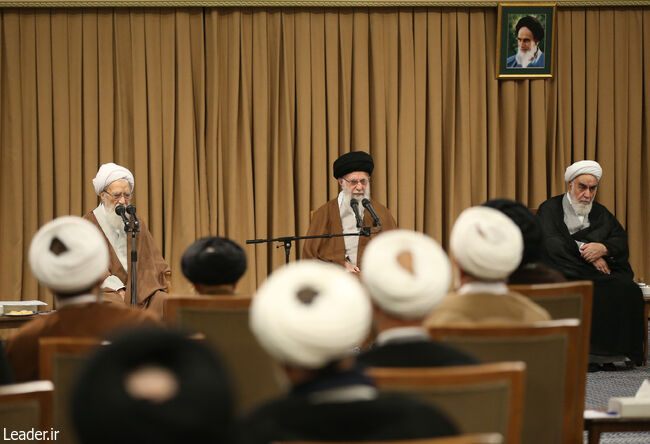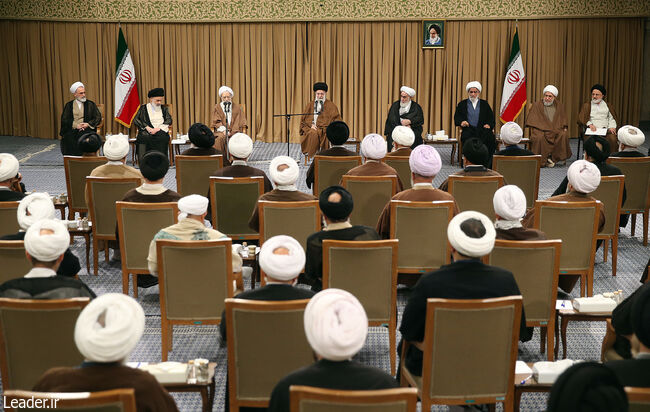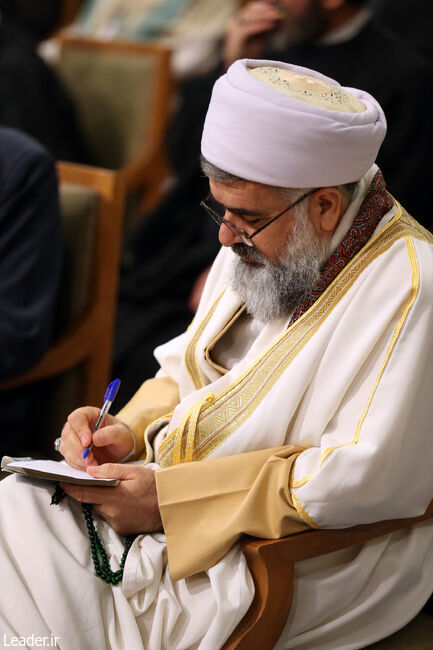The Leader of the Islamic Revolution met with the members of the Assembly of Experts this morning. He called the Assembly the most closely related institution to the Revolution and pointed out particular motivations and activities aimed at stopping the Revolution and reversing the movement of the nation. He said, "The main responsibility of the leadership is to continue the country's direction toward the goals of the Revolution; therefore, the Assembly of Experts, which plays a unique role in determining the leadership, acquires unparalleled significance."
Also referring to the growth, dynamism, and continued powerful resistance of Hezbollah and Hamas, Ayatollah Khamenei said, "Based on the unwavering promises of God's help and the victorious experiences of resistance of Hezbollah and Hamas in the past decades, recent events will undoubtedly lead to the victory of the front of truth and resistance."
In the meeting, which took place at the end of the Second Session of the Sixth term of the Assembly of Experts, the Leader of the Revolution spoke about the position of the Assembly of Experts in Islamic law and the system, describing the Assembly as the most revolutionary institution in terms of its connection to the Islamic Revolution and said, "The reason for using this description is because of the role of the Assembly in selecting the leadership."
Ayatollah Khamenei described the primary goal of the Revolution as "realising Tawhid" in the broad sense of implementing Islam in the country and people's lives. He added that the leadership is tasked with maintaining the direction of the country's movement and the system towards this fundamental goal.
The Leader of the Revolution referred to the deviation of significant revolutions such as the French and Soviet revolutions after several decades, saying, "The danger of regression exists for all great popular movements."
He cited numerous warnings and reminders from the Holy Quran about regression as a very serious danger, adding, "The Lord warns in the Holy Quran that if you obey the disbelievers, you will experience regression and retrogression, or that the disbelievers will turn you back to disbelief after you have believed."
Ayatollah Khamenei deemed preventing deviation and regression in any system to require a crucial factor, saying, "In the Islamic system, this major task falls on the leadership, and the responsibility of selecting this decisive factor rests with the Assembly of Experts."
Explaining the importance of this assembly, he said, "The existence of the Assembly of Experts demonstrates that there is no interruption in the continuous progress of the system toward its goals, for, if necessary, the Experts will promptly designate the next leader, ensuring this continuity with full strength and capability."
The Leader of the Revolution regarded the system's independence from individuals as an underlying truth in the prompt process of selecting the leadership. He said, "These transitions show that, while specific individuals have missions to accomplish, the system does not rely on them and can continue its path without them." In this context, he referred to God's warning to Muslims in Surah Ale-Imran, saying, "In the third year of the Hijra, when the Islamic system had not yet been firmly established, God reproaches the Muslims, asking if, should the Prophet (pbuh), the most central figure in existence, pass away or be killed, would they turn back." Ayatollah Khamenei described the points made about the importance of the role of the Assembly of Experts as indicative of the utmost need for precision and care in selecting the Leader. He said, "The utmost diligence must be exercised in assessing the conditions specified in the Constitution for the Leader to ensure that all conditions are met, including a firm inner conviction in the Revolution's path and goals and the readiness for sustained, tireless movement along this path. This qualifies them for the responsibility.
In another of his remarks, the Leader of the Revolution noted the coincidence of these days with the fortieth anniversary of the martyrdom of the great and tireless fighter of our time, Martyr Sayyed Hassan Nasrallah. He gave honour to his memory and other leaders and notable figures of the Resistance, including Martyrs Haniyeh, Safi al-Din, Sinwar, and Nilforushan. He said, "These martyrs brought additional honour and strength to Islam and the Resistance Front."
He saw Hezbollah as Martyr Nasrallah's enduring legacy, saying, "Due to the astonishing courage, wisdom, patience, and extraordinary reliance on God of the Leader of the Resistance, Hezbollah has seen tremendous growth, to the extent that the enemy, armed with all kinds of material and propaganda weapons, has been unable, and by divine grace will remain unable, to overcome this remarkable phenomenon." Pointing to the obvious blood-stained hands of the U.S. and some European countries in the crimes in Gaza and Lebanon, Ayatollah Khamenei considered that the result of the continued impressive struggles in Lebanon, Gaza, and Palestine would be the victory of the front of truth and resistance. He said, "One reason for the promising outlook of the Resistance Movement is the unwavering divine promise, which, after granting permission for jihad to those who have been oppressed, assures them that if they support God's cause, victory from God is certain."
He considered the past decades of victories by the Resistance against the Zionist aggressors as another clear indication of the ultimate triumph of the righteous front. He said, "For nearly 40 years, Hezbollah has forced the Zionist regime to retreat from the cities of Beirut, Sidon, and Tyre, and ultimately cleared southern Lebanon, liberating its cities, villages, and heights from the foul presence of that regime."
The Leader of the Revolution indicated Hezbollah's remarkable power in repelling and defeating "an enemy armed with various military, political, propagandistic, and economic weapons, and relying on the support of global corruptors such as U.S. Presidents" as evidence of the gradual increase in its capabilities—transforming from a small group of fighters for God's cause into a vast organisation. He added, "The Palestinian Resistance has had a similar victorious experience, engaging with the Zionist regime nine times from 2009 to the present and prevailing in all nine confrontations."
He identified the current victor in the battle against the Zionist occupiers as the Palestinian Resistance, stating, "The goal of the Zionists in this war was to eradicate Hamas. However, despite massacring tens of thousands, martyring the leaders of the Resistance and Hamas, and globally revealing a hideous, detestable, isolated, and disparaging image of themselves, they have failed to achieve this goal. Hamas continues to fight, which signifies the defeat of the Zionist regime."
Ayatollah Khamenei described Hezbollah as strong and continuing its mighty struggle against the Zionist regime, stating, "In Lebanon and elsewhere, some people have mistakenly begun to speak mockingly of Hezbollah, assuming it has weakened. They are mistaken and deluded; despite the loss of great figures like Sayyed Hassan Nasrallah and Sayyed Safiuddin, the morale of Hezbollah remains high, with fighters on the ground engaged in a resilient battle. The enemy has not been able, nor will it be able, to overcome Hezbollah."
He noted, "The world and the region will witness the day when these fighters conclusively defeat the Zionist regime, and we hope that you all see that day."
The Leader of the Revolution also honoured the memory of the late representatives of the Sixth Assembly of Experts, martyrs Raisi and Al-Hashem.
At the beginning of the meeting, Ayatollah Movahedi Kermani, the head of the Assembly of Experts, shared some points on the need for experts and media outlets to work on clarifying the concepts of the Revolution and the principle of Wilayat-e Faqih (Guardianship of the Islamic Jurist).
Ayatollah Hosseini Bushehri, the Vice President of the Assembly of Experts, also discussed the final statement of the session and provided a report on the second meeting of the Sixth term of the Assembly. He mentioned the key points in the speeches given before the agenda by 16 members of the Assembly on cultural, economic, social, and political topics, as well as issues related to their constituencies.



